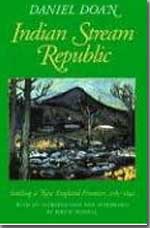Index
Authorship
Journals/Travelogues
Girl Scout Trip
The Doan Sisters Go to England
Our Canterbury Tale
A Family Tradition!
Boot Saddle, to Horse and Away!
The Lot
The Silent Generation
With Daniel Doan:
The Diary Man & Hiking Guides
Indian Stream Republic (editor)
Authorship as a Profession
A Clean, Well-Lighted Place
Writers Ultimately Live in Imaginary Places
A Blank Page
Aunt Pleasantine
Remember the Reader
Book-Reviewing
Sequel Reader
Desks
Writing A BORN MANIAC
For Book Clubs
THE CHEERLEADER: A Book Club Guide
(A PDF that can be downloaded and printed as a booklet) for distribution to book club participants)
INDIAN STREAM REPUBLIC:
SETTLING A NEW FRONTIER, 1785-1842
Author: Daniel Doan
Editor: Ruth Doan MacDougall
Daniel Doan completed the text of this history but died before he could edit it. His daughter Ruth edited the manuscript and saw it through to publication.
 Daniel Doan, whose books about the White Mountains are premier guides, combines a woodsman's perceptions, a naturalist's eye, and a novelist's craft into a lyrical tale of settlers whose attempt at an impossible independence comes dangerously close to precipitating war between two nations. Three years after his death and 30 years after it was written, his book has at last been published, with his daughter's help.
Daniel Doan, whose books about the White Mountains are premier guides, combines a woodsman's perceptions, a naturalist's eye, and a novelist's craft into a lyrical tale of settlers whose attempt at an impossible independence comes dangerously close to precipitating war between two nations. Three years after his death and 30 years after it was written, his book has at last been published, with his daughter's help.
In the late eighteenth and early nineteenth centuries, while governments, politicians, and entrepreneurs argued about the boundary between northern New England and British Canada, a group of hardy individuals were otherwise occupied, carving a life in the wooded frontier that would come to be known as Indian Stream. The Treaty of Paris ending the American Revolution set the United States boundary at "the northwesternmost head of the Connecticut River," but with three streams feeding into that head, conflict was inevitable. For nearly 60 years residents of this wild northern outpost were caught in a dispute that rendered both land titles and international boundaries uncertain. As squabbling increased among the United States and Canadian governments, New Hampshire legislators, and two companies claiming land rights, the settlers decided to take matters into their own hands. In 1832, they declared themselves the independent Indian Stream Republic, establishing a constitution, a bicameral legislature, courts, laws, and a militia. But New Hampshire and Canada were not impressed. The state tried to enforce its laws, the jurisdictional battle escalated, the Indian Stream militia "invaded" Canada, and blood -- though only a trickle--was shed.
"Scrupulously researched and beautifully written, this is a wonderful study of a little-known American frontier and the incomparable individualists who decided to establish and defend their own government there."
—Howard Frank Mosher, author of Where the Rivers Flow North
Privacy Policy
This website does not collect any personal information. We do collect numerical data as to traffic to the site, but this data is not attached in any way to our visitors' personal or computer identities. Those clicking through to other websites linked from this page are subject to those sites' privacy policies.
